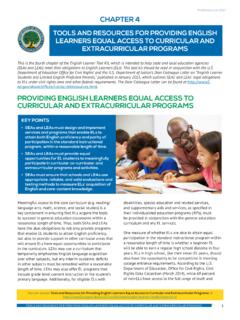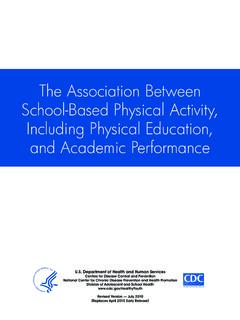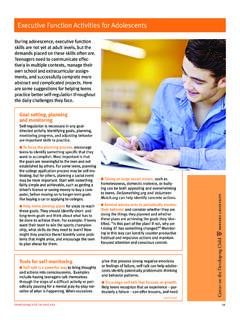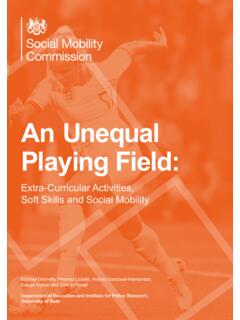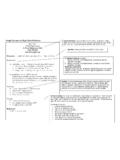Transcription of The Benefits of Participating in Extracurricular ...
1 The Benefits of Participating in Extracurricular activities Claudette Christison Abstract Understanding factors that contribute to students' success is of great interest to educators. Research indicates that participation in Extracurricular activities positively correlates with students' development both academically and personally. Students who participate in Extracurricular activities have greater academic success, greater character development, especially in the areas of time-management and leadership skills, more positive social development, and greater interest in community involvement. The educational system can use such information to encourage students to participate in activities that will enhance their personal and academic achievements. Participating in Extracurricular activities has positive effects on students' success. More than 80% of youth participate in Extracurricular activities (Fredricks, 2011, p.)
2 379). Being involved in Extracurricular activities offers important opportunities for adolescent development (Blomfield &. Barber, 2009), such as peer relations, appropriate social conduct, and basic skills for academic achievement (Metsapelto & Pulkkinen, 2012). Students' academic achievements are the basis of most of the curricular outcomes that teachers use to evaluate students' success. However, it is becoming increasingly important that students have opportunities to learn much more than just the curricular outcomes. Adolescents who participate in Extracurricular activities demonstrate higher levels of academic achievement, greater character development, greater social development, and a greater sense of the importance of community involvement. Academic Achievement Students who participate in Extracurricular activities experience higher levels of academic achievement.
3 These effects have been researched since the early 1930s (Shulruf, Tumen, &. Tolley, 2007). Students who participate frequently in Extracurricular activities tend to have higher grades, better test scores, and more positive educational experiences in general (Fredricks, 2011). For example, participation in Extracurricular activities is associated with a 2%. increase in math and science test scores (Lipscomb, 2007, p. 470). Furthermore, students involved in activities have a 10% increase in their expectations of attaining a college degree, as compared to non-participants (Lipscomb, 2007, p. 470). Therefore, students should be encouraged to participate in such activities throughout their school years. Adolescents practise skills while Participating in the Extracurricular activities that contribute to their academic success. First. through organized games, students learn to follow instructions.
4 They learn to listen to instructions and apply them to achieve a desired outcome. Second, also through organized activities , students learn the importance of persistence and motivation (Fredricks, 2011). They understand that accomplishing goals often requires focus and hard work. Third, students learn goal setting and problem solving (Wormington, Henderlong Corpus, & Anderson, 2012). Following instructions, persistence, motivation, goal setting, and problem solving are all skills that are acquired during Extracurricular activity participation and that transfer to students' academic success. The type of Extracurricular activity participated in has different effects on students' academic success. For example, students who participate in athletic clubs tend to have increased math and science (Lipscomb, 2007) and literacy (Shulruf et al., 2007) scores.
5 Extracurricular participation in arts and crafts also results in higher academic scores and better working skills (Metsapelto & Pulkkinen, 2011). Additionally, participation in academic clubs yields higher academic attainment (Shulruf, 2010). Understanding how participation in a variety of different BU Journal of Graduate Studies in Education, Volume 5, Issue 2, 2013 17. activities affects academic achievement can help educators to assist students in achieving their specific academic goals. Character Development Participating in Extracurricular activities contributes to adolescents' character development. Students who participate in Extracurricular activities report higher levels of self-concept and self- worth (Blomfield & Barber, 2009). They also have opportunities to develop personal interests and discover their strengths and weaknesses (Fredricks & Eccles, 2008), which is especially important during the adolescent stage of self-exploration (Knifesend & Graham, 2012).
6 Building students' self-concept and character development will encourage confidence, which will inspire students to be comfortable being unique individuals. Many of the character-building skills common to Extracurricular activities are needed in the workplace, but are not regularly evaluated and practised in the classroom (Lipscomb, 2007). First, students develop time management skills (Burgess, 2013). They learn to prioritize and use time effectively. Second, students build leadership skills (Barnett, 2008) that will support their success in post-secondary institutions and lifelong careers. Students who possess leadership skills are more likely to become managers and earn a higher salary than students who do not (Lipscomb, 2007). Third, students learn to accept constructive criticism (Mckeyane, 2013), which is a skill required for intellectual and personal growth.
7 Lastly, students have higher levels of self-confidence (Strapp & Farr, 2010) and resiliency (Fredricks & Eccles, 2008). The participation in Extracurricular activities builds students' time management skills, leadership skills, self-confidence, resiliency, and ability to accept constructive criticism, which are all components important to character development. The type of Extracurricular activity affects different components of character development. Students who participate in academic clubs build leadership skills, whereas students who participate in athletic clubs develop problem-solving skills (Fredricks & Eccles, 2008). Students who contribute time performing in the arts record higher levels of positive self-development (Metsapelo & Pulkkinen, 2012) and greater engagement in the school environment (Knifesend &. Graham, 2012). Participation in both academic and athletic activities results in higher levels of self-worth (Blomfield & Barber, 2009).
8 Increasing students' levels of self-worth creates a feeling of connectedness to their learning environment, which enhances their motivation to grow academically and personally. Understanding which character development skills are practised by Participating in specific Extracurricular activities can guide students to improve precise areas of self-awareness. Social Development Participating in Extracurricular activities is beneficial to students' social development. Group activities build team-work and communication skills, which are necessary for success in the workforce and other future endeavors. Students are continually looking for a greater sense of belonging (Knifesend & Graham, 2012). Belonging to Extracurricular groups is important for providing access to the relationships and networks that influence positive outcomes for students (Shulruf, 2010, p.)
9 595). Group activities provide opportunities for students to build connections with others who have similar interests and goals, which will increase their motivation to commit long term to an activity that also increases enjoyment. Also, Extracurricular activities provide opportunities for students to connect with positive social groups that influence students to avoid negative life choices (Veltz & Shakib, 2013). In addition to building peer relationships, participation in Extracurricular activities provides opportunities for students to build relationships with supportive adults (Fredricks, 2011). Having a mentor is crucial for students who do not have adult support and guidance in their lives. Participating in Extracurricular activities builds adolescents' social skills by creating a sense of belonging, building positive 18 BU Journal of Graduate Studies in Education, Volume 5, Issue 2, 2013.
10 Networks of friends, and building relationships with supportive adults. Different types of Extracurricular activities have differential social skill Benefits . Group activities build teamwork skills, communication skills, and relationship skills, but individual activities build independence and stimulate motivation (Metsapelto & Pulkkinen, 2012). Participation in either type of activity provides a sense of belonging to the school environment , which enhances their engagement in school . Engagement correlates with students' academic and social success (Wormington et al., 2012). Participating in Extracurricular activities builds teamwork, communication, relationships, and a sense of belonging, all of which help students to develop socially and be successful in school. Community Involvement Participation in Extracurricular activities demonstrates the importance of community involvement.










